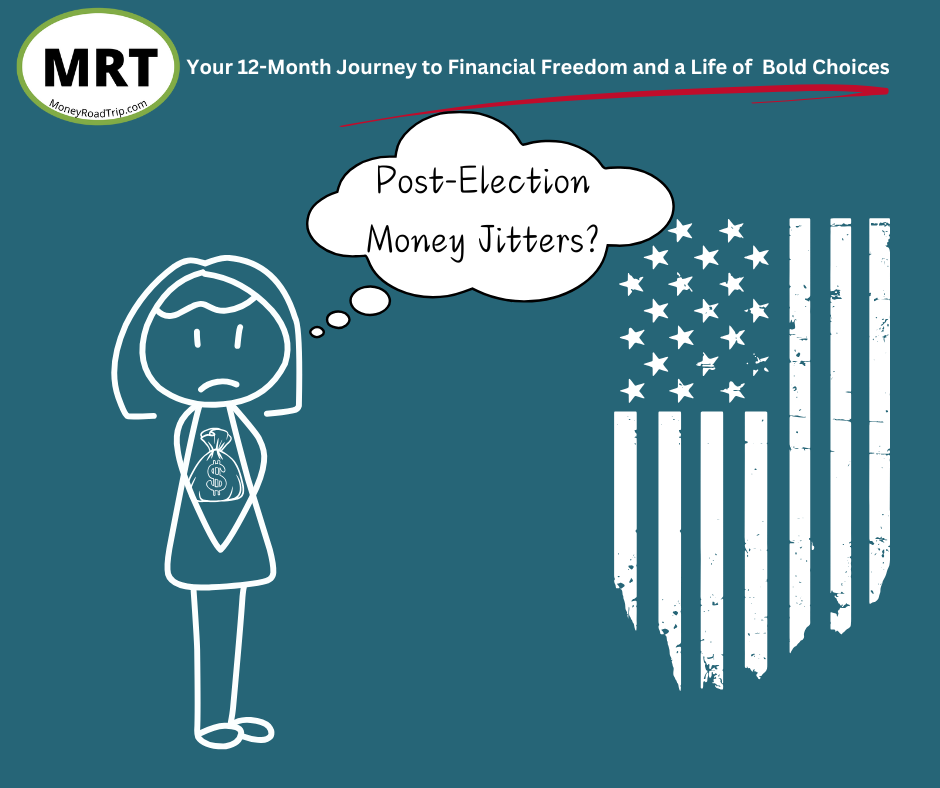Every time there's a major election, financial fears start rumbling. And this year, it’s a doozy, with tremendous implications for the economy. Under a new Trump administration, we could see tariffs create real hardship for the vast majority of Americans, as the cost of basic goods skyrockets. And then there’s the unfunded mass deportation, which not only impacts the lives of so many neighbors and friends, but will create huge employment gaps in the agricultural and construction sectors especially.
It sounds like a disaster in the making, right? So what do you do about your retirement accounts? I wish I had a crystal ball and could look into the future with definitive conclusions. But no one can. So how do you protect your funds from a failing economy? Or in the reverse, if the economy continues to grow, how do you take advantage of it? What we’ve learned in the past is that people pull out their funds at the worst time imaginable, thereby losing the gains that come after the crash. So what do you do? Here are some practical tips.
Don’t Let Doomsday Pundits Steer Your Decisions
Every era seems to have its doomsday prophets. They’re often loud, convincing, and quick to say, “This time, it’s different! The economy is about to implode!” Remember 2008? People shouted from every rooftop that the Great Recession was the end of the American economy as we knew it. Yet here we are, with markets having surged multiple times since then.
Doomsday noise is powerful and can cloud your decision-making. If you give in to the panic and cash out your 401(k), you lock in losses and miss out on the long-term growth potential of your investments. History tells us that while there are always economic ups and downs, markets generally recover and grow over time. So, rather than making a panicked decision, take a breath and think about the long game.
Stick with the Fundamentals: Timing Matters
The fundamentals of investing doesn’t change: your timeline dictates your strategy. How soon you need the money should guide how you handle your retirement account.
Short-Term Needs (1-5 Years): If you’re close to retirement or need access to cash soon, consider moving part of your 401(k) to safer investments, like bonds or money market accounts, that aren't as volatile.
Mid-Range Needs (5-10 Years): For those who have a few more years, a balanced approach works well. Consider allocating your funds into a mix of stocks and bonds to grow steadily without taking on too much risk.
Long-Term Needs (10+ Years): If you’re looking at 10 years or more, you’ve got the luxury of time. Stock market downturns will come, but there’s also time for the markets to recover and grow. An aggressive, stock-heavy portfolio is likely to yield higher returns over the long term.
Think of these timelines as your guideposts. Sure, things look dicey now, but if your retirement is a decade away, consider this a minor chapter in the larger story of your investment journey.
Diversify Your Investments—and Yourself!
Post-election jitters are a great reminder to think outside traditional stocks and bonds. This doesn’t mean abandoning your 401(k), but it does mean exploring ways to diversify your income streams and build your financial security.
Invest in Yourself: Is there a side hustle you’ve always wanted to start? Whether it’s freelancing, teaching a class, or launching an online store, investing in yourself can be a fantastic way to create extra income while keeping your day job.
Look Into Real Estate: Real estate can be a great way to diversify. Whether you buy a rental property or invest in a Real Estate Investment Trust (REIT), it’s a way to expand your portfolio beyond stocks and bonds.
Be Cautious with Cryptocurrency
Cryptocurrency often shows up as a “get rich quick” option, but the reality is more complicated. Crypto remains a speculative investment, meaning it’s high-risk and its value is driven largely by market sentiment rather than underlying fundamentals like earnings or revenue.
One reason for crypto’s volatility is its ease of manipulation. For instance, influential figures like Elon Musk have demonstrated that a single tweet or statement can cause crypto values to surge or plummet in seconds. With Musk now taking on a key role in the new administration, there’s the potential that crypto could be favored or receive regulatory boosts, which could impact the U.S. dollar’s standing. This type of scenario has the potential to disrupt the value of traditional assets as well.
Crypto might seem exciting, but its swings are far more extreme than those in traditional markets. If you choose to invest in cryptocurrency, remember to limit it to a very small portion of your portfolio—if any—so that a sudden shift doesn’t risk your entire retirement savings.
Takeaway: Weather the Storm Without Sacrificing Your Future
Economic anxiety is real, and it’s tempting to make hasty choices. But as history shows, the best financial decisions are often made with patience. Stay focused on your personal timeline, think about diversification, and remember that your future self will thank you for taking the long view—even when the headlines look stormy.




